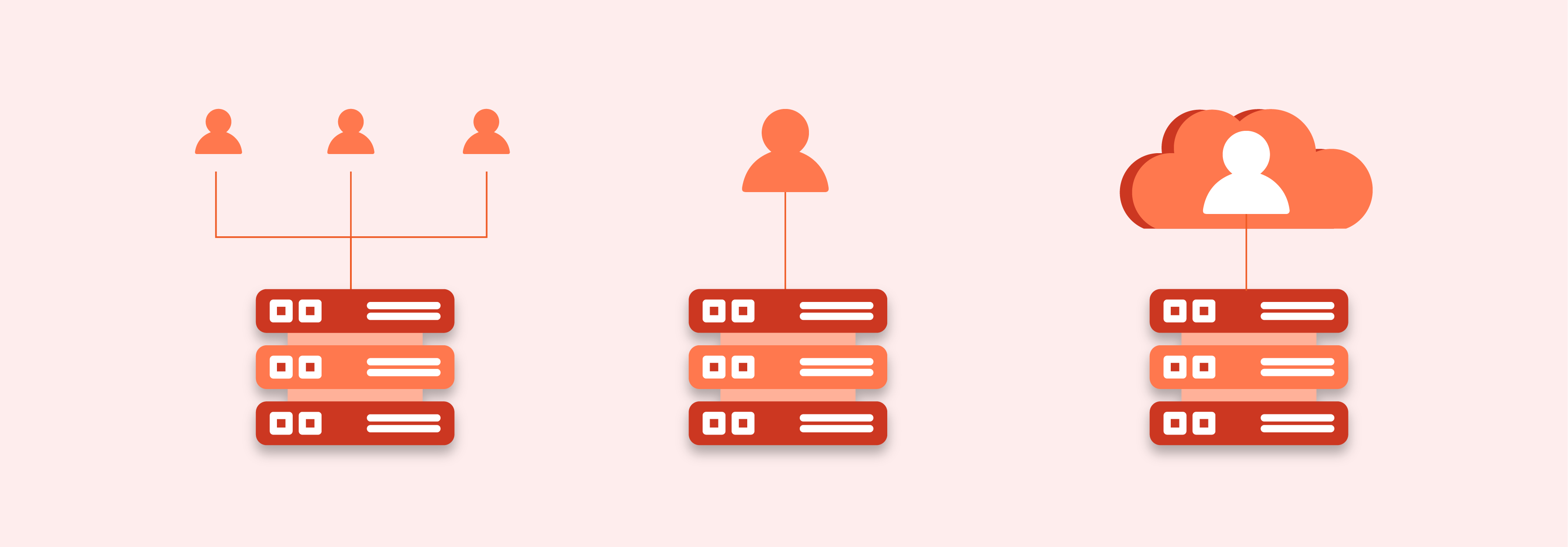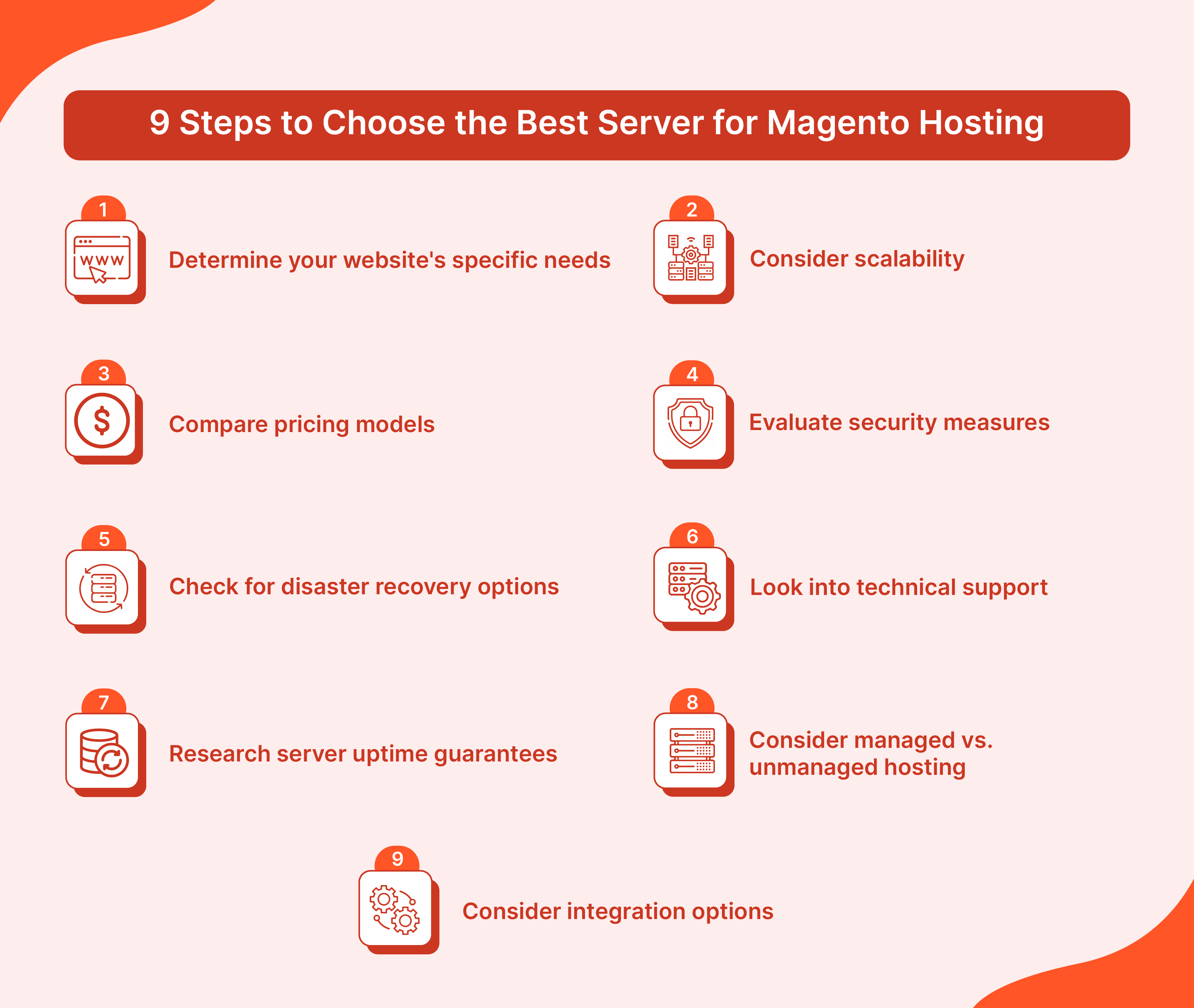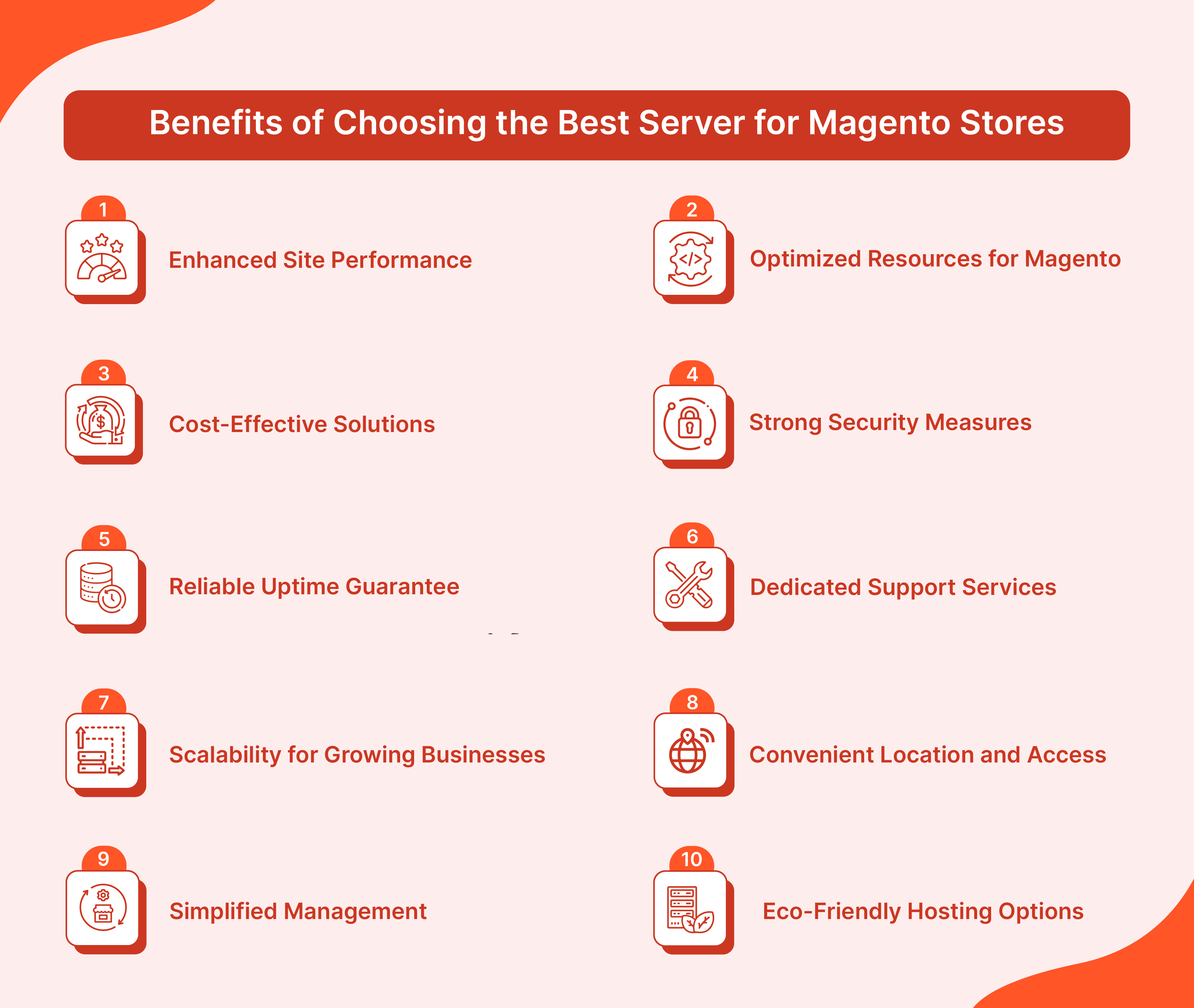
Best Server for Magento Hosting: Uptime & Scalability
Want to ensure uptime and scalability of your e-store? Choose best server for Magento hosting. Each server type has pros and cons, so pick the one that fits your e-store best. This article will guide you to choose the best server for your Magento hosting.
Key Takeaways
-
Learn how to choose the best server for Magento hosting to ensure uptime and scalability for your e-store.
-
Grasp essential metrics: response time, scalability, redundancy, backups, and security.
-
Compare shared, dedicated, and cloud server types to find the most suitable option.
-
Learn best practices for Magento server upkeep to enhance performance, security, and scalability.
-
Get answers to frequently asked questions about the role of servers in web hosting.
-
Key Performance Indicators to Choose the Best Magento Hosting Server
-
Best Practices for Magento Server Maintenance and Management
Key Performance Indicators to Choose the Best Magento Hosting Server
1. Server Response Time
-
Optimal Performance: Aim for a server that offers quick response times, ensuring users don't experience delays.
-
Load Handling: Choose servers that maintain performance even under heavy traffic to prevent slowdowns during peak sales periods.
2. Data Processing Capabilities
-
Database Management: Magento stores require robust database performance due to the complex data handling.
-
Processing Power: Pick a server with adequate CPU and RAM specifications to handle Magento's resource-intensive operations.
3. Scalability Potential
-
Growth-Friendly: Opt for hosting solutions that allow easy scaling, accommodating the growth of your e-store without major overhauls.
-
Upgrade Ease: Ensure that the server can be upgraded in terms of resources without any significant downtime.
4. Redundancy and Backup Systems
-
Fail-safety: Incorporate servers with built-in redundancy to protect against hardware failures.
-
Backup Solutions: Regular Magento backups are essential for e-commerce stores. They help in recovering from data loss incidents quickly. Therefore, choose a server with reliable backup options.
5. Security Features
-
Data Protection: Besides regular backups, ensure the server has robust security protocols like firewalls and SSL certificates to safeguard your e-store's data.
-
PCI Compliance: If you accept online payments, ensure the server meets all PCI compliance requirements.
Comparing Server Types: Shared vs. Dedicated vs. Cloud

1. What is a Shared Server for Magento Hosting?
A shared server for Magento hosting refers to a hosting environment where multiple websites or applications share the same physical server and its resources.
This type of hosting is typically less expensive than dedicated or cloud servers. The cost is divided among multiple users, but shared servers may have slower performance and less configurability than other hosting options.
Shared servers are often used for smaller websites or applications that do not require many resources or high traffic. They are also suitable for those on a tight budget, as they can acquire hosting services at a lower cost.
How Shared Hosting Works?
Shared hosting works by sharing a single physical server with multiple users. Each user has an account. They can upload their website or application files onto the server. These files are then accessible to the public through their unique domain name.
A hosting provider manages the shared server. They ensure all websites access resources like storage space, bandwidth, and server settings. In a shared hosting environment, resources are divided among users. This means if one website has high traffic or resource usage, it can impact other websites on the server.
Pros & Cons of Shared Servers
| Pros of Shared Servers | Cons of Shared Servers |
|---|---|
| Cost-Effective: Shared hosting is generally the most affordable option, making it ideal for individuals and small businesses. | Limited Resources: Since resources are shared among multiple users, there is a limit to the processing power, memory, and storage available. |
| Ease of Use: Shared servers often come with a user-friendly control panel, making them easy to manage without technical expertise. | Potential for Reduced Performance: High demand on server resources by one user can lead to slower performance for others. |
| Maintenance and Management: The hosting provider takes care of server maintenance, updates, and security, reducing the burden on the user. | Less Control: Users cannot install custom software or configurations due to shared environment constraints. |
2. What is a Dedicated Server for Magento Hosting?
A dedicated server for Magento hosting is a type of web hosting. This setup allocates an entire physical server to one user or website. This allocation ensures that resources like processing power, memory, storage, and bandwidth are not shared with other users.
Dedicated servers are commonly employed by large businesses or websites with high-traffic and resource-intensive applications such as Magento.
How Dedicated Hosting Works
Dedicated hosting involves a single physical server solely allocated to a specific business. This arrangement enables the company to use the server's hardware and software resources independently. They do not have to share them with any other organization.
Comparing VPS and dedicated servers, they function similarly. The key distinction is the virtual nature of the isolated server instance in VPS. Dedicated server environments, on the other hand, utilize physical legacy IT assets. They provide business owners with enhanced control, performance, and security.
Pros and Cons of Dedicated Servers
| Pros of Dedicated Servers | Cons of Dedicated Servers |
|---|---|
| Complete Control: With a dedicated server, the user can fully control the server environment and customize the hardware and software. | Cost: Dedicated servers are significantly more expensive than shared hosting or VPS solutions due to the exclusive use of server resources. |
| Enhanced Performance: Users benefit from all the server's resources, resulting in higher performance levels for demanding applications like Magento. | Technical Expertise Required: Managing a dedicated server often requires more technical skills to handle maintenance and troubleshooting issues. |
| Improved Security: Dedicated servers offer a more secure environment as the resources are not shared with other clients. | Maintenance Responsibility: The user is typically responsible for the server's maintenance and updates, which can burden some organizations. |
| Customization Flexibility: Businesses can tailor their server to meet specific needs, including the choice of operating system, hardware specs, and software installations. | Resource Scalability: While dedicated servers provide ample resources, scaling these resources can be challenging without proper infrastructure planning. |
| Exclusive IP Address: Each dedicated server usually comes with its unique IP address, which is beneficial for SEO and reduces the risk of IP blacklisting. | Energy Consumption: Physical servers consume more energy than virtualized environments, which may concern eco-conscious businesses. |
3. What is a Cloud Server for Magento Hosting?
A cloud server for Magento hosting uses cloud computing technology to provide resources to websites and applications. This server type differs from traditional dedicated servers. It doesn't depend on physical hardware but on a network of virtualized servers collaborating.
How Cloud Hosting Works?
Cloud hosting functions by distributing resources required to operate websites and applications across a network of virtual servers. These servers are typically in varied data centers. They collaborate to offer a scalable and dependable infrastructure for hosting websites and applications.
When a website or application requires additional resources, it can seamlessly access them from the cloud server network without downtime or disruption. This flexibility and scalability enable businesses to adjust resources easily based on their needs.
Pros and Cons of Cloud Server
| Pros of Cloud Server | Cons of Cloud Server |
|---|---|
| High Scalability: Resources can be dynamically allocated to meet traffic demands, allowing for easy upscaling or downscaling. | Internet Dependency: Requires constant internet connectivity, and performance can be impacted by bandwidth and network issues. |
| Reduced Costs: Eliminates the need for upfront investments in hardware and reduces maintenance expenses. | Variable Costs: While it can be more cost-efficient, the pay-as-you-go model can result in fluctuating expenses. |
| Disaster Recovery: Enhanced backup and recovery solutions due to distributed resources, reducing the risk of data loss. | Security Concerns: As data is hosted online, potential security vulnerabilities may need to be addressed. |
| Accessibility: Can be accessed from anywhere, providing convenience and flexibility for users. | Complexity: May require a skilled team to manage and configure the cloud resources effectively. |
9 Steps to Choose the Best Server for Magento Hosting

1. Determine your website's specific needs
Identify your website's requirements before selecting a cloud server for Magento hosting. Consider traffic volume, database usage, and storage needs. This will guide you in choosing a server with the right resources.
2. Consider scalability
Choose a Magento cloud server that offers easy upscaling and downscaling options to accommodate any changes in your website's needs. This will prevent any potential disruptions or downtime during periods of high traffic.
3. Compare pricing models
Cloud server providers offer various pricing models. These include pay-as-you-go or monthly subscriptions. Consider which model best suits your budget and long-term goals.
4. Evaluate security measures
Magento hosting deals with sensitive customer data. Choose a server with robust security measures, such as firewalls, data encryption, and consistent backups.
5. Check for disaster recovery options
Having a backup plan is essential for unforeseen incidents or disasters. Choose a server with reliable disaster recovery solutions. This ensures the safety of your data.
6. Look into technical support
A good cloud server provider should offer 24/7 technical support to address any issues that may arise. Consider the level of support and response time the provider offers before deciding.
7. Research server uptime guarantees
Server uptime maintains a smooth and uninterrupted website experience. Look for providers that offer high uptime guarantees, preferably 99.9% or above, to ensure minimal website downtime.
8. Consider managed vs. unmanaged hosting
Managed hosting involves the provider handling server management tasks, while unmanaged hosting requires you to handle these tasks yourself. Consider your technical skills and resources before deciding which option is best for your website.
9. Consider integration options
Consider how easily the server integrates if you already use other cloud services, such as a content delivery network (CDN). This will help streamline your website's performance and management.
Best Practices for Magento Server Maintenance and Management
1. Continuous Ecommerce Platform Updates
Keep your Magento installation up-to-date. Regular updates contain optimizations. They secure the latest features, improving performance and security for users and customers.
2. Regularly Review Hosting Plans
Examine your hosting plan regularly to ensure it meets your evolving ecommerce needs. Upgrading may be necessary as your number of visitors grows.
3. Implement Effective Caching Strategies
Caching stores content to reduce server load. It speeds up page delivery on subsequent clicks, which is essential for fast customer experiences.
4. Employ a Robust Firewall
Secure your Magento site with a robust firewall. This helps protect against threats and maintain the integrity of customer data and your ecommerce operations.
5. Optimize for Speed with SSD
Utilize SSD hosting solutions for your Magento 2 platform. This will enhance the speed of your ecommerce site. SSDs swiftly handle data, decreasing loading times. This helps in retaining visitors.
6. Utilize a Content Delivery Network (CDN)
A CDN can distribute your content globally. It ensures visitors access your site quickly, no matter where they are. This makes every click efficient and effective.
7. Prioritize Customer Support Services
Choose a hosting provider with excellent customer support. This includes 24/7 service and live chat. These aspects add value and help in swift issue resolution.
8. Explore Magento-Specific Hosting Solutions
Investigate hosting providers that offer Magento-specific hosting plans. These tailor-made solutions can boost your site’s performance. They also provide Magento-optimized support.
9. Monitor Site Performance and User Load
Regularly monitor your site's performance. Understand how visitors interact with your platform. This data informs better optimization and hosting decisions. Keep an eye on user load and take proactive steps to upgrade your hosting plan as needed.
Benefits of Choosing the Best Server for Magento Stores

1. Enhanced Site Performance
With the right hosting service, migration to VPS hosting or SSD storage can significantly boost your site's speed and performance. This allows faster loading times for web pages, a critical factor in retaining customer interest.
Moreover, SSD storage in many web hosting plans provides quicker data access and better durability than traditional hard drives.
2. Optimized Resources for Magento
Magento-specific hosting packages are tailored to complement the unique stack requirements of Magento sites. These services often use nginx as part of their web server configuration, delivering the best performance for Magento's architecture.
This custom approach ensures that developers can optimize their sites in a way that generic hosting plans might not support.
3. Cost-Effective Solutions
Competitively priced hosting plans with money-back guarantees offer store owners a risk-free way to test hosting services.
This helps find a service that fits their needs and budget without committing long-term. With a variety of packages available in the market. Store owners can choose a price point. This allows them to invest in other areas of their business.
4. Strong Security Measures
Security patches, SSL certificate inclusion, and regular server monitoring are pivotal to maintaining a secure online store.
Hosting companies prioritize customer data protection by offering these features. It's a key reason store owners should choose hosting service providers to safeguard their business and customer information.
5. Reliable Uptime Guarantee
An uptime guarantee ensures that your ecommerce store remains accessible to anyone around the clock. Downtime can mean lost sales, making reliability a non-negotiable aspect of successful online stores.
Reputable hosting services emphasize their reliability, offering uptime assurances as a testament to their robust infrastructure.
6. Dedicated Support Services
An excellent support team offers immediate phone, live chat, or email assistance. This ensures prompt handling of any hosting issues.
Including web hosting plans can greatly speed up issue resolution, minimizing impacts on sales and customer satisfaction.
7. Scalability for Growing Businesses
Hosting services should allow for easy scalability to accommodate growth in traffic and sales. As store owners witness a surge in online activity, scaling up resources becomes important.
This may involve expanding SSD storage or upgrading to a higher version of VPS hosting. These steps help your store maintain top-notch customer experiences.
8. Convenient Location and Access
Selecting a host with server locations near your primary audience enhances the accessibility of your site. Proximity to servers usually translates to faster load times.
This leads to a better user experience. Furthermore, this can boost customer reliability and uptime in those geographic areas.
9. Simplified Management
Some hosting companies provide simplicity in their management dashboards. This benefits store owners who may not be technically inclined.
It allows them to easily manage everything about their hosting and dedicate more time to other business operations. Simple control panels give anyone the tools to manage their hosting effectively.
10. Eco-Friendly Hosting Options
For environmentally-conscious businesses, some web hosting plans come with green credentials. These may include using renewable energy or carbon offsetting.
Aligning with a business’s values, eco-friendly hosting can attract customers who prioritize sustainability. It can be a unique selling point for your ecommerce store in a competitive market.
FAQs
1 . What is the role of a server in web hosting?
A server is a computer or software that provides services to other computers, known as clients, over a network. In web hosting, the server stores all the files and data for a website and delivers them to users when they access it. It also manages incoming traffic, security, and other aspects of website management.
2 . What are the best Magento hosting options for ecommerce stores?
Some popular hosting providers for Magento include MGT-Commerce, SiteGround, Bluehost, HostGator, GoDaddy, etc. It is important to consider factors such as server performance, security features, and customer support when choosing a hosting option for your ecommerce store. You can also consult an experienced web developer or agency to help you select the best hosting option for your specific needs.
3 . Can I transfer my website from one hosting provider to another?
Yes, transferring your website from one Magento hosting provider to another is possible. However, the process can be complex and may require technical knowledge.
It is recommended to seek assistance from your new hosting provider or a professional web developer to ensure a smooth transfer without any data loss or downtime.
4 . What is SSL, and why is it important for web hosting?
SSL (Secure Socket Layer) is a security protocol that encrypts the communication between a web server and a browser. It ensures secure transmission of sensitive data such as credit card numbers, login credentials, etc.
5 . How do shared, managed, and cloud servers differ?
Shared hosting involves multiple websites residing on a single server. Websites share resources, making it cost-effective for small-scale websites. Managed hosting provides a more tailored experience. The hosting provider takes care of maintenance, security, and updates.
It is often used for specific applications like WordPress. Cloud servers offer scalable resources and higher reliability. They run on multiple interconnected virtual servers. This setup ensures minimal downtime and flexibility.
6 . Which type of server hosting is best for handling high traffic volumes?
Cloud servers are usually the best choice for efficiently managing high-traffic volumes. They offer scalability, enabling easy resource increase as needed.
Managed hosting can work well, too, if it supports traffic spikes with adequate resources. Shared hosting is budget-friendly but often lacks sufficient capacity for high traffic unless explicitly scalable.
Summary
Elevate your e-commerce store success with the best server for Magento hosting needs. Here's a quick recap:
-
Performance Matters: Prioritize server response time, scalability, redundancy, and security.
-
Choose Wisely: Compare shared, dedicated, and cloud servers to find the best fit.
-
Nine Steps to Success: Follow our guide for a smooth selection process.
-
Best Practices: Optimize with updates, caching, firewall protection, and more.
-
Benefits: Enjoy improved performance, cost-effectiveness, reliable uptime, and dedicated support.
Seeking seamless performance and hassle-free management for your e-store?
Opt for managed Magento hosting's essential support and maintenance for cost-effectiveness and peak performance.




